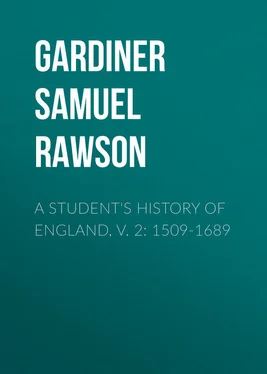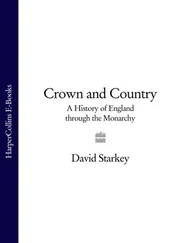Samuel Gardiner - A Student's History of England, v. 2 - 1509-1689
Здесь есть возможность читать онлайн «Samuel Gardiner - A Student's History of England, v. 2 - 1509-1689» — ознакомительный отрывок электронной книги совершенно бесплатно, а после прочтения отрывка купить полную версию. В некоторых случаях можно слушать аудио, скачать через торрент в формате fb2 и присутствует краткое содержание. Издательство: Иностранный паблик, Жанр: История, foreign_antique, foreign_prose, на английском языке. Описание произведения, (предисловие) а так же отзывы посетителей доступны на портале библиотеки ЛибКат.
- Название:A Student's History of England, v. 2: 1509-1689
- Автор:
- Издательство:Иностранный паблик
- Жанр:
- Год:неизвестен
- ISBN:нет данных
- Рейтинг книги:3 / 5. Голосов: 1
-
Избранное:Добавить в избранное
- Отзывы:
-
Ваша оценка:
- 60
- 1
- 2
- 3
- 4
- 5
A Student's History of England, v. 2: 1509-1689: краткое содержание, описание и аннотация
Предлагаем к чтению аннотацию, описание, краткое содержание или предисловие (зависит от того, что написал сам автор книги «A Student's History of England, v. 2: 1509-1689»). Если вы не нашли необходимую информацию о книге — напишите в комментариях, мы постараемся отыскать её.
A Student's History of England, v. 2: 1509-1689 — читать онлайн ознакомительный отрывок
Ниже представлен текст книги, разбитый по страницам. Система сохранения места последней прочитанной страницы, позволяет с удобством читать онлайн бесплатно книгу «A Student's History of England, v. 2: 1509-1689», без необходимости каждый раз заново искать на чём Вы остановились. Поставьте закладку, и сможете в любой момент перейти на страницу, на которой закончили чтение.
Интервал:
Закладка:
7. Queen Catharine and Anne Boleyn.– It was a great disappointment to Henry that he had no surviving male children. England had never been ruled by a queen, and it was uncertain whether Henry's daughter, Mary, would be allowed to reign. Henry had already begun to ask himself whether he might not get rid of his wife, on the plea that a marriage with his brother's wife was unlawful, and this consideration had the greater weight with him because Catharine was five years older than himself and was growing distasteful to him. When in 1521, in his book against Luther, he assigned a divine origin to the Papacy, he told More of a secret reason for this exaltation of the Pope's power, and it is possible that this reason was his desire to obtain from the Pope a divorce under the pretext that it would secure a peaceful succession. At all events his scruples regarding his marriage with Catharine were quickened in 1522by the appearance at court of Anne Boleyn, a sprightly black-eyed flirt in her sixteenth year, who took his fancy as she grew into womanhood. Flirt as she was, she knew her power, and refused to give herself to him except in marriage. The king, on his part, being anxious for a legitimate son, set his heart on a divorce which would enable him to marry Anne. Wolsey, knowing the obstacles in the way, urged him to abandon the project; but it was never possible to turn Henry from his course, and Wolsey set himself, in this as in all things else, to carry out his master's wishes, though he did so very reluctantly. Moral scruples had little weight with Wolsey, but in 1525, when he learnt the king's design, there were strong political reasons against its execution, as England was in alliance with Catharine's nephew, the Emperor, Charles V., and a divorce would be certain to endanger the alliance.
8. Henry's Demand for a Divorce. 1527-1528.– Two years later, in 1527, as Henry was veering round towards a French alliance (see p. 374), he had no longer much reason to consider the feelings of the Emperor. On the other hand, the strong position which Charles occupied in Italy after the sack of Rome made it improbable that Clement VII. who was then Pope, and who thought more of his political than of his ecclesiastical position, would do anything to thwart the Emperor. An attempt made by Henry in 1527to draw Clement to consent to the divorce failed, and in 1528Wolsey sent to Rome his secretary, Stephen Gardiner, an adroit man of business, to induce Clement to appoint legates to decide the question in Henry's favour. Clement, anxious to please all parties, appointed Wolsey and another cardinal, Campeggio, as his legates, but took care to add that nothing done by them should be valid until it had received his own approval.
9. The Legatine Court. 1529.– The court of the two legates was opened at Blackfriars in 1529. Before proceeding to business they tried hard to induce either Henry to abstain from asking for a divorce or Catharine to abstain from resisting his demand. In such a matter Catharine was as firm as the self-willed Henry. Even if she could consent to leave the throne, she could not, if she retained any sense of womanly dignity, acknowledge that she had never been a wife to Henry, or suffer her daughter to be branded with illegitimacy. When king and queen were at last cited to appear Catharine knelt before her husband. She had, she said been his true and obedient wife for twenty years, and had done nothing to deserve being put to open shame. As it was, she appealed to Rome. The queen's cause was popular with the masses, who went straight to the mark, and saw in the whole affair a mere attempt to give a legal covering to Henry's lust. The legates refused to consider the queen's appeal, but when they came to hear arguments on the merits of the case they were somewhat startled by the appearance of the aged Fisher, Bishop of Rochester, one of the holiest and most learned prelates of the day, who now came voluntarily, though he knew that Henry's wrath was deadly, to support the cause of Catharine. Campeggio took advantage of the strong feeling which was growing against the king to interpose delays which he knew to be well-pleasing to Clement, and before these delays were at an end Clement annulled all the proceedings in England and revoked the cause to Rome. Most probably he was alarmed at the threats of the Emperor, but he had also reasons of his own for the course which he took. Henry did not ask for a divorce on any of the usual grounds, but for a declaration that his marriage had been null from the beginning. As, however, his marriage had been solemnised with a Papal dispensation, Clement was asked to set aside the dispensation of one of his predecessors, a proceeding to which no Pope with any respect for his office could reasonably be expected to consent.
10. The Fall of Wolsey. 1529-1530.– Henry was very angry and made Wolsey his victim. Wolsey's active endeavours to procure the divorce counted as nothing. It was enough that he had failed. He was no longer needed to conduct foreign affairs, as Henry cared now only for the divorce, and raised no objection when Charles and Francis made peace at Cambrai without consulting his interests. The old nobility, headed by the Duke of Norfolk, the son of the victor of Flodden, had long hated Wolsey bitterly, and the profligate courtiers, together with the friends and relatives of Anne, hated him no less bitterly now. Before the end of the year proceedings under the Statute of Præmunire (see pp. 258, 382) were taken against him on the ground that he had usurped legatine powers. It was notorious that he had exercised them at the king's wish, and he could have produced evidence to show that this had been the case. In those days, however, it was held to be a subject's duty not to contest the king's will, and Wolsey contented himself with an abject supplication for forgiveness. He was driven from his offices, and all his goods and estates seized. The college which he had founded at Ipswich was sold for the king's use, and his college at Oxford, then known as Cardinal College, was also seized, though it was afterwards refounded under the name of Christchurch by the robber king. Wolsey was reduced to extreme poverty. In 1530he was allowed to return to the possession of the archbishopric of York; but he imprudently opened communications with the French ambassador, and harmless as they were, they gave a handle to his enemies. Henry ordered him to be charged with treason. The sufferings of his mind affected his body, and on his way to London he knew that he was a dying man. "Father Abbot," he said, in taking shelter in Leicester Abbey, "I am come hither to leave my bones among you." "If I had served my God," he acknowledged as he was passing away, "as diligently as I have done my king, He would not have given me over in my grey hairs."
11. The House of Commons and the Clergy. 1529.– No king ever felt the importance of popularity like Henry, and the compassion which had been freely given to Catharine by the crowd, on her appearance in the Legatine Court, made it necessary for him to find support elsewhere. It had been Wolsey's policy to summon Parliament as seldom as possible. It was to be Henry's policy to summon it as frequently as possible. He no longer feared the House of Lords, and either he or Wolsey's late servant, Thomas Cromwell, an able and unscrupulous man, who rose rapidly in Henry's favour, perceived the use which might be made of the House of Commons. By his influence the king could carry the elections as he pleased, and when Parliament met in 1529it contained a packed House of Commons ready to do the king's bidding. The members were either lawyers or country gentlemen, the main supports of the Tudor monarchy, and Henry strengthened his hold upon them by letting them loose on the special abuses which had grown up in the ecclesiastical courts. Lawyers and country gentlemen were very much what they had been in the fifteenth century, without large political ideas or fine spiritual perceptions; but now that they were relieved of the oppression of the great nobles they turned upon the clergy, who claimed fees and dues which they disliked paying, and who used the powers of the ecclesiastical tribunals to exact heavy payments for moral and spiritual offences.
Читать дальшеИнтервал:
Закладка:
Похожие книги на «A Student's History of England, v. 2: 1509-1689»
Представляем Вашему вниманию похожие книги на «A Student's History of England, v. 2: 1509-1689» списком для выбора. Мы отобрали схожую по названию и смыслу литературу в надежде предоставить читателям больше вариантов отыскать новые, интересные, ещё непрочитанные произведения.
Обсуждение, отзывы о книге «A Student's History of England, v. 2: 1509-1689» и просто собственные мнения читателей. Оставьте ваши комментарии, напишите, что Вы думаете о произведении, его смысле или главных героях. Укажите что конкретно понравилось, а что нет, и почему Вы так считаете.












